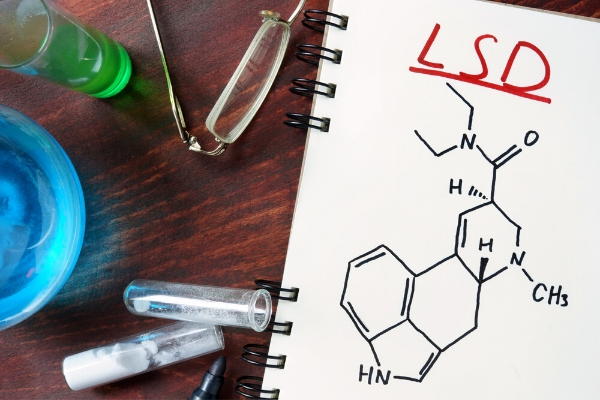Lysergic acid diethylamide – more commonly known as LSD – is a psychedelic drug known for causing hallucinations and changes in perception. When small doses of LSD are taken, the user might experience changes in mood, mild or moderate visual hallucinations, and changes in thought and behavior. When taken in larger doses, LSD can cause serious hallucinations and can seriously distort the perception of both space and time. LSD is commonly taken orally, ingested in the form of a dried gelatin sheet, sugar cube, or small piece of decorated blotting paper. This potent drug can also be consumed in the form of a liquid or a capsule. There are many misconceptions about LSD and other psychedelic drugs, the most common being that such drugs are non-addictive. While it is true that hallucinogens are less addictive than drugs like heroin, prescription medications, and alcohol, they can still be psychologically addictive. If an individual abuses LSD for any extended period of time, permanent brain damage and psychosis could occur. It is crucial that those who have been abusing LSD or any other psychedelic drug seek professional care immediately, so as to prevent lasting side effects. 
Is LSD Addictive?
People take drugs for many different reasons. Maybe they are peer pressured into experimenting with drugs, or they have prescribed a habit-forming medication, or they are genetically predisposed to drug abuse, or they are attempting to self-medicate the symptoms of an underlying mental health disorder. Those who use LSD will similarly use it for a number of reasons. Perhaps they are experimenting, or they are actively seeking an escape from reality. It is true that LSD is not physically addictive – not in the same way that other chemical substances are. It will not usually cause compulsive use or the development of obsessive, drug-seeking behaviors. This is partly because the experience of “getting high” is generally so intense that people will limit their use. Rather than chasing a high and quickly coming down, they will experience an intense experience that will last for several hours. The rate at which LSD tolerance builds is also extremely fast; those that use the drug two days in a row, for example, will need to take a much bigger amount the second day. Those that use LSD for close to a week consecutively will likely no longer be able to feel any effects. This is another reason why people tend to limit their use. For some, however, the escape from reality that the drug provides can be addictive – usually if there are underlying factors present, such as mental illness or unresolved trauma.
Treatment for Psychedelic Abuse
While LSD is not considered a chemically addictive substance, it can be habit-forming. The drug can be psychologically addictive, leading to repeated use and the rapid development of serious mental and physical side effects. Those who use the drug on a somewhat regular basis are at extreme risk of permanent brain damage, and of the development of lasting mental illness. Some common effects of short-term abuse include tremors, hallucinations, a distorted sense of time, mood swings, and dilated pupils. The long-term effects of LSD abuse include anxiety/panic attacks, disassociation, an inability to function normally, mental health issues, and psychosis. The National Survey on Drug Use and Health reported that the demographic most likely to abuse LSD are young adults, specifically between the ages of 18 and 25. In 2016 alone, it was estimated that 209,000 individuals in this age range had abused LSD within the past year. If you or someone you love has been struggling with LSD abuse, we at Evoke Wellness at Miramar are available to help. We have extensive experience working with those who struggle with psychological addictions to hallucinogenic drugs. Our comprehensive treatment program focuses on drug addiction and all underlying disorders, paving the way for lifelong recovery.


